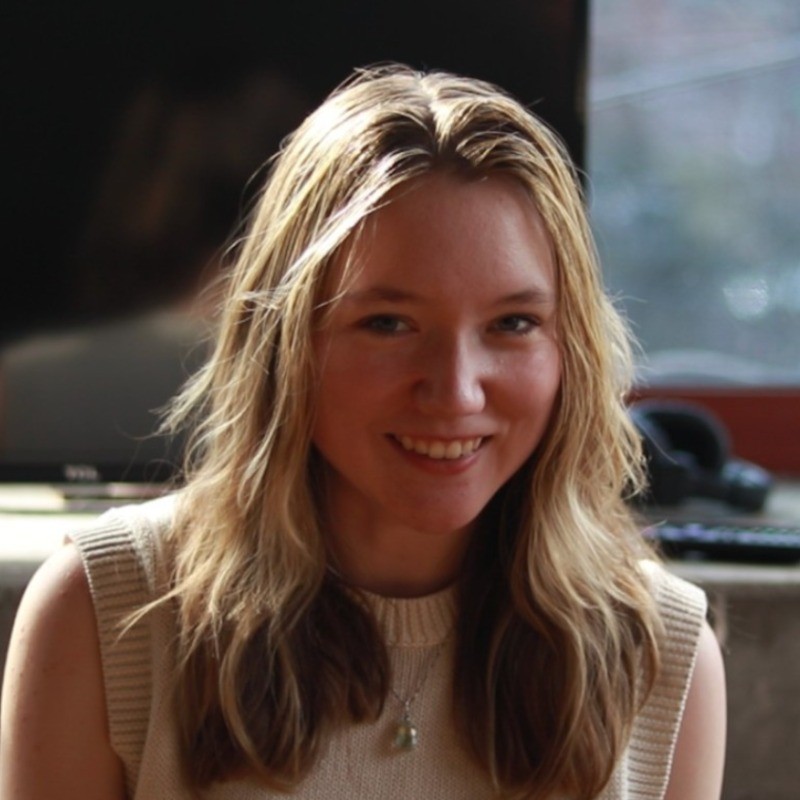Neuroscience undergraduate student earns 2024 Goldwater Scholarship

University of Chicago rising fourth-year student Eva McCord has been awarded the 2024 Barry Goldwater Scholarship, which supports students who intend to pursue research careers in the natural sciences, mathematics, and engineering.
She is among the 437 U.S. college students to be selected for the prestigious scholarship out of a pool of more than 5,000 applicants. Scholarships are awarded annually to cover winners’ costs of tuition, fees, books, and room and board up to $7,500 per year. Additionally, funds are designed to help STEM students fund their research during their final years of undergraduate study.
Learn more about Eva McCord below:
Eva McCord is majoring in neuroscience, and her interest in making research part of her career has been bolstered by her work as an undergraduate researcher in the Ruthenburg Lab, as well as her role as a teaching assistant in the Biological Sciences Collegiate Division.
“I came to UChicago because I wanted to be surrounded by people who deeply love learning,” McCord said. “It’s no surprise that the College instilled within me an appreciation for, and a desire to contribute to, the rhythm and momentum of scientific research, where you have the potential to learn something completely new about the natural world—and can then share it with others.”
Tell us about your research
Since my very first biology class at UChicago, I have been fascinated with the idea that genes “respond” to the environment, constantly being turned on and off as though by an intricate series of switches. And so, my research is interested in exploring how one protein—actin, specifically actin in the nucleus—acts as one of these “switches” during major gene expression events in neurons.
To do this, I’ve been looking specifically at how actin affects the process by which a stem cell—a cell that is capable of maturing into virtually any type of cell—becomes a neuron. This is a process called neural differentiation. To become a specific cell type, a stem cell has to stop expressing its own “stem cell genes,” and begin expressing cell-specific genes (in this case, “neural genes,” otherwise referred to as “neural markers”). What I’ve found is that, if you alter the typical behavior of actin in stem cells’ nuclei, and then attempt to turn those stem cells into neurons, you’ll see major differences in those mature neurons’ gene expression profiles compared to those that had normally-functioning actin.
Those changes in gene expression are non-trivial! If just a single protein has a potentially huge role in making sure neurons become neurons, this same protein might be involved in major neurobiological diseases where neurons don’t form properly. These kinds of ideas are exactly why I’m so excited about epigenetic therapies, and are a large part of why I want to pursue an MD-PhD.
What does it mean to you to receive the Goldwater Scholarship?
Being named a 2024 Barry Goldwater Scholar reaffirms my existing belief that science is an intrinsically inclusive and collaborative endeavor—an endeavor that thrives and is augmented by the act of making space for ideas that spawn from diverse perspectives and unique backgrounds.
I am the granddaughter of Polish immigrants who arrived in this country with just ten dollars in hand. My mother raised my two brothers and I as a single mother, and in middle school, my family was at risk of homelessness. Being a Goldwater Scholar demonstrates that I, even in light of the challenges I have had to overcome and the spaces I have had to create for myself as a low-income student, have the capability and drive to contribute to and care for the delicate and exciting ecosystem of scientific inquiry. My background is not a hindrance to my scientific career, but rather has equipped me with the very skills—tenacity, humility, and adaptability—that make me a scientist.
I would love to thank my mother, my grandmother, my uncle, and my two brothers—being a Barry Goldwater Scholar is just as much their accomplishment as it is mine. They nurtured my love for the sciences by nurturing me, for always believing in me, and for always being just a phone call away. I also owe much of my scientific career to my PI, Dr. Alex Ruthenburg. Dr. Ruthenburg was my first biology professor at UChicago, and his infectious enthusiasm inspired me to explore both epigenetics and teaching; this past fall, I was Dr. Ruthenburg’s teaching assistant for BIOS 20234 (Molecular Biology of the Cell, the Advanced Fundamentals Track), the very class that inspired me to explore a future in research.